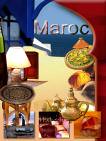}
Morocco, a country of diversity par excellence, is a country in the plural, especially in language, many languages and dialects are everywhere without influence anything at his unit. The Arabic with its different varieties, Tamazight, with its three major varieties: the tariff, tachelhit and Tamazight, the language of tributes Hassania Saharan (region of the Moroccan Sahara), in addition to foreign languages: French, English and English, the richness of this country's rich history.

